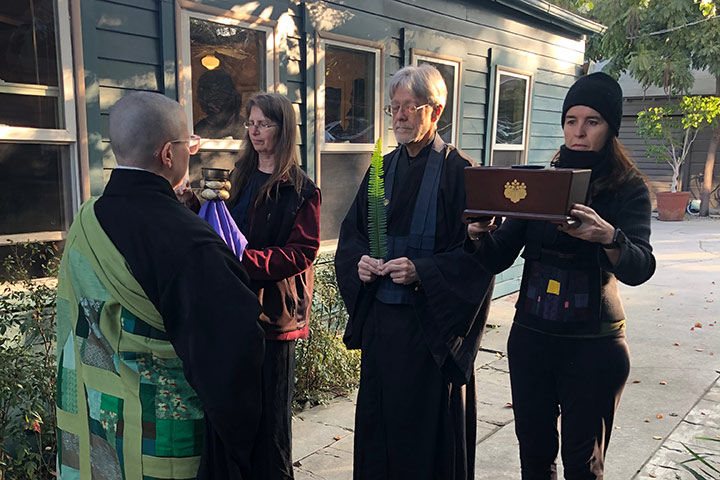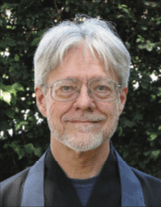
The Recommendation of Zazen for Everyone
January 1, 2021
 by George Mukei Horner
by George Mukei Horner
Dogen Zenji brought the Soto lineage of Zen from China to Japan. Born in the year 1200, his father died when he was only two or three years old, and his mother when he was seven. As the smoke of offered incense rose over his mother’s body, he keenly felt the evanescence of life and awakened his desire to study the Dharma.
In his early teens, he ordained as a monk at a Tendai monastery on Mt. Hiei, receiving the name Buppo Dogen, Buddha-Dharma Way-Source. At this time, Japanese Buddhism was dominated by the Shingon and Tendai schools. Tendai was especially powerful politically. Some of its larger temples had armies of warrior monks, which they used both in violent conflict with rival temples, and to pressure the government. It was a common belief among Japanese Buddhists that they had entered the long-predicted Age of the Degenerate Dharma, whose conditions were so unconducive to enlightenment that seeking it was pointless. The best one could try for was rebirth in the Pure Land, where awakening would be easy.
It may be while training as a new monk that Dogen first heard the teaching that everyone is endowed with Buddha-nature from birth, and it raised in him a consuming question: If so, then why is practice effort necessary?
In time, feeling his understanding was not deepening, he visited other temples and eventually came to Kennin-ji, a monastery in Kyoto founded by Master Eisai, who had received dharma transmission in China in the Linji (Rinzai) lineage of Zen. Around age seventeen, he became a student of Myozen, the abbot of Kennin-ji. Myozen recognized that Dogen was an extraordinary student, and when he travelled to China in 1223, Dogen accompanied him.
The Way is basically perfect and all-pervading.
They went to Jingde Monastery on Mt. Tiantong, at which Myozen’s late teacher, Eisai, had trained. Dogen trained there for a year and a half, then spent several months visiting other monasteries in search of a teacher. What he saw left him disappointed. With some teachers, their methods seemed unhelpful, and they did not allow students to ask clarifying questions. There were also instances of corruption, of monks attempting to acquire documents of dharma transmission illegitimately, or bribing government officials to be appointed abbot of a temple.
Dogen returned to Jingde when Master Rujing was appointed abbot. An authentic, highly regarded teacher of the Caodong (Soto) school, he emphasized the practice of zazen and required seriousness and dedication in his students. Dogen wrote to Rujing, asking to be accepted as a student who could meet with him privately. Rujing accepted him, and in their meetings Dogen asked deep, probing questions, correcting and clarifying his understanding.
One night, during zazen, Rujing encouraged the monks saying, “Zazen is dropping off body and mind!” On hearing this, Dogen was suddenly awakened, inside and outside fell away, and he experienced the true meaning of the teachings. When Master Rujing had verified his realization, he gave Dogen Zenji dharma transmission and his seal of approval.
In 1227, after four years in China, Dogen Zenji returned to Japan. It was then, as he began to work with students of his own, that he wrote Fukanzazengi, the Universal Recommendation of Zazen. This was his declaration that zazen is the essential, authentic practice of all Buddha-ancestors; that it is — as he put it in his next essay for his students, Bendowa (On the Endeavor of the Way)— the front gate for directly entering the buddha-dharma.
Dogen Zenji opens with the seeming paradox that had confronted him for so long in his own practice.
The Way is basically perfect and all-pervading. How could it be contingent upon practice and realization? The Dharma-vehicle is free and untrammeled. What need is there for concentrated effort? Indeed, the Whole Body is far beyond the world’s dust. Who could believe in a means to brush it clean? It is never apart from one right where one is. What is the use of going off here and there to practice? And yet, if there is the slightest discrepancy, the Way is as distant as heaven from earth. If the least like and dislike arises, the Mind is lost in confusion.
The Way is identical with the very life of each of us. It’s impossible to be apart from it. But even the slightest failure to understand this sets us heaven and earth apart from the Way from which we can never be apart. So what to do?
Need I mention the Buddha, who was possessed of inborn knowledge? — the influence of his six years of upright sitting is noticeable still. Or Bodhidharma’s transmission of the mind- seal? — the fame of his nine years of wall-sitting is celebrated to this day. Since this was the case with the saints of old, how can people of today dispense with negotiation of the Way?
Need I mention the Buddha, who was possessed of inborn knowledge?
Dogen’s answer is to do as they did, to negotiate the Way by sitting, being present, and feeling out a path through the confusion to an ever deeper understanding.
You should therefore cease from practice based on intellectual understanding, pursuing words and following after speech, and learn the backward step that turns your light inwardly to illuminate your self … Cast aside all involvements and cease all affairs. Do not think good or bad. Do not administer pros and cons. Cease all movements of the conscious mind, the gauging of all thoughts and views. Have no designs on becoming a buddha … Think of not-thinking. How do you think of not-thinking? Non-thinking. This in itself is the essential art of zazen.
How many ways does he need to say it? Stop thinking about your thoughts when you sit! Of course thoughts will come up spontaneously. This is natural. But when they do, if you discipline yourself to not engage with them, they will not linger. Then, deeply settled in body and mind, body and mind of themselves will drop away, and you will recognize the meaning of the teachings and know that you are whole.
In general, this world and other worlds as well, both in India and China, equally hold the Buddha-seal, and over all prevails the character of this school, which is simply devotion to sitting, total engagement in immobile sitting. Although it is said that there are as many minds as there are people, still they (all) negotiate the Way solely in zazen … Please, honored followers of Zen. Long accustomed to groping for the elephant, do not be suspicious of the true dragon.
In the story of the blind men and the elephant, each one touches a different place and gains a different impression of the animal — its leg makes it seem like a pillar; its side, like a wall; its tail, a rope; its trunk, a snake. They’re not wrong, but they mistake its true nature by experiencing only part of it. In the tale of Yeh Kungtsu, he so revered dragons that he filled his house with images of them. But when a true dragon delightedly came to visit, Yeh was terrified and drove it away.
Devote your energies to a way that directly indicates the absolute.
And the Buddha-seal likens the way that a teacher’s awakened mind enables the same awakening in the student’s, to the way a carved seal reproduces its image when stamped on paper. The entire lineage, every Buddha-ancestor, bears the mark of authentic awakening through zazen.
Dogen Zenji references these things for students who may well have come to Zen after years of believing that the best they could hope for from Buddhist practice was rebirth in a better place. He’s saying, do not distrust this practice. It’s been handed down from Shakyamuni Buddha, through every Buddha-ancestor, to us. This is how they verified the Way. It still works, even in this age. I verified it for myself, and so can you. He concludes,
Devote your energies to a way that directly indicates the absolute. Revere the person of complete attainment who is beyond all human agency. Gain accord with the enlightenment of the buddhas; succeed to the legitimate lineage of the ancestors’ samadhi. Constantly perform in such a manner and you are assured of being a person such as they. Your treasure-store will open of itself, and you will use it at will.
Through the practice of zazen, we verify that even though each of us is distinctly, uniquely ourself, we and our life are a single whole. That person of complete attainment who is beyond all human agency is you, as you truly are. The treasure-store is your life itself. To use it at will is to live in accord with the enlightenment of the buddhas.
What does that look like? Recognize that you are not separate from all that is, and refrain from leading a harmful life or encouraging other to do so. Seek to live in harmony with all life and the environment that sustains it.
Encounter the diversity of life with respect and dignity. Refrain from thinking or speaking in terms of errors and faults; from harboring resentment, rage, or revenge; from employing guilt and blame to elevate yourself at others’ expense, as if you and they are separate. Dehumanize no one. Give and accept love and friendship without clinging.
Listen and speak from the heart, and deceive neither yourself nor others. As best you can, see and act in accord with what is, cultivate a mind that sees clearly, embrace all experience directly, and accept what each moment has to offer. Knowing that your life is in your care, acknowledge responsibility for all of it, give your best effort, and accept the results.
Freely give, ask for, and accept what is needed, and refrain from fostering a mind of poverty in yourself or others. Be satisfied with what you have, in the sense that everything you need for living this moment, is already present in this moment.
These words, of course, are very general. It’s the particular ingredients of our life here, now, that give them content and meaning. As Roshi Bernie would say of these ingredients, use them all, make the best meal you can, and serve the wholeness of life.
This is what it means to honor our life as a peacemaker, to not speak ill of the Three Treasures, and to recognize ourself and others as manifestations of the Oneness of Buddha, the Diversity of Dharma, and the Harmony of Sangha.
Your treasure-store will open of itself, and you will use it at will.
Resident member Mukei is the ZCLA Zendo Steward and an empowered Preceptor.
